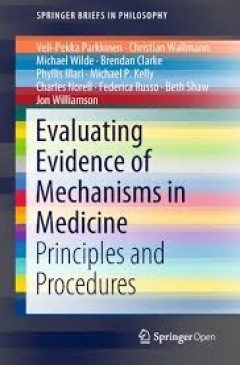Filter by

The EBMT Handbook: Hematopoietic Stem Cell Transplantation and Cellular Thera…
This Open Access edition of the European Society for Blood and Marrow Transplantation (EBMT) handbook addresses the latest developments and innovations in hematopoietic stem cell transplantation and cellular therapy. Consisting of 93 chapters, it has been written by 175 leading experts in the field. Discussing all types of stem cell and bone marrow transplantation, including haplo-identical…
- Edition
- 7
- ISBN/ISSN
- 9783030022785
- Collation
- XL, 702 hlm,: ill, lamp;
- Series Title
- -
- Call Number
- -

Evaluating Evidence of Mechanisms in Medicine : Principles and Procedures
This book is open access under a CC BY license. This book is the first to develop explicit methods for evaluating evidence of mechanisms in the field of medicine. It explains why it can be important to make this evidence explicit, and describes how to take such evidence into account in the evidence appraisal process. In addition, it develops procedures for seeking evidence of mechanisms, fo…
- Edition
- -
- ISBN/ISSN
- 978-3-319-94610-8
- Collation
- XVIII, 125
- Series Title
- Evaluating Evidence of Mechanisms in Medicine : Principles and Procedures
- Call Number
- 610 PAR e

Hepatocellular Carcinoma
This open access book offers a comprehensive review of hepatocellular carcinoma (HCC) with a particular focus on the pathobiology and clinical aspects of the disease, including diagnosis and treatment. HCC is becoming one of the most common causes of cancer-related death worldwide. It is the fifth most common malignancy in men and the ninth in women, with an estimated 500,000 to 1 million new c…
- Edition
- 1
- ISBN/ISSN
- 978-3-031-09371-5
- Collation
- XV, 217
- Series Title
- Updates in Surgery
- Call Number
- XV, 217

The Life of Breath in Literature, Culture and Medicine
This open access book studies breath and breathing in literature and culture and provides crucial insights into the history of medicine, health and the emotions, the foundations of beliefs concerning body, spirit and world, the connections between breath and creativity and the phenomenology of breath and breathlessness. Contributions span the classical, medieval, early modern, Romantic, Victori…
- Edition
- 1
- ISBN/ISSN
- 978-3-030-74443-4
- Collation
- -
- Series Title
- Palgrave Studies in Literature, Science and Medicine
- Call Number
- XXII, 555

E-Cigarettes and the Comparative Politics of Harm Reduction
This open access book offers the first in-depth study of the history and current debates surrounding electronic cigarettes comparing the UK, US and Australia. Since their introduction, e-cigarettes have been the subject of much public, media and regulatory attention, with discussion centring on whether these devices encourage or discourage smoking. This study delves into the history of policyma…
- Edition
- 1
- ISBN/ISSN
- 978-3-031-23658-7
- Collation
- XIV, 144
- Series Title
- -
- Call Number
- -

Aging Well : Solutions to the Most Pressing Global Challenges of Aging
This open access book outlines the challenges of supporting the health and wellbeing of older adults around the world and offers examples of solutions designed by stakeholders, healthcare providers, and public, private and nonprofit organizations in the United States. The solutions presented address challenges including: providing person-centered long-term care, making palliative care accessibl…
- Edition
- 1
- ISBN/ISSN
- 9789811321641
- Collation
- XVII, 218 hlm; ill., lamp.,
- Series Title
- -
- Call Number
- -

Precision Oncology and Cancer Biomarkers: Issues at Stake and Matters of Concern
This open access book reflects on matters of social and ethical concern raised in the daily practices of those working in and around precision oncology. Each chapter addresses the experiences, concerns and issues at stake for people who work in settings where precision oncology is practiced, enacted, imagined or discussed. It subsequently discusses and analyses bioethical dilemmas, scientific c…
- Edition
- 1
- ISBN/ISSN
- -
- Collation
- -
- Series Title
- Human Perspectives in Health Sciences and Technology
- Call Number
- XIV, 281

Mining Gold and Manufacturing Ignorance
This open access book charts how South Africa’s gold mines have systematically suppressed evidence of hazardous work practices and the risks associated with mining. For most of the twentieth century, South Africa was the world’s largest producer of gold. Although the country enjoyed a reputation for leading the world in occupational health legislation, the mining companies developed a syste…
- Edition
- 1
- ISBN/ISSN
- 978-981-19-8327-6
- Collation
- XIII, 459
- Series Title
- -
- Call Number
- -

Kantianism for Animals
This open access book revises Kant’s ethical thought in one of its most notorious respects: its exclusion of animals from moral consideration. The book gives readers in animal ethics an accessible introduction to Kant’s views on our duties to others, and his view that we have only ‘indirect’ duties regarding animals. It then investigates how one would have to depart from Kant in order t…
- Edition
- 1
- ISBN/ISSN
- 978-3-031-01930-2
- Collation
- -
- Series Title
- The Palgrave Macmillan Animal Ethics Series
- Call Number
- XXI, 245

Anti-Vivisection and the Profession of Medicine in Britain
This book is open access under a CC BY 4.0 license. This book explores the social history of the anti-vivisection movement in Britain from its nineteenth-century beginnings until the 1960s. It discusses the ethical principles that inspired the movement and the socio-political background that explains its rise and fall. Opposition to vivisection began when medical practitioners complained…
- Edition
- 1
- ISBN/ISSN
- 978-1-137-55697-4
- Collation
- -
- Series Title
- The Palgrave Macmillan Animal Ethics Series
- Call Number
- XXI, 217
 Computer Science, Information & General Works
Computer Science, Information & General Works  Philosophy & Psychology
Philosophy & Psychology  Religion
Religion  Social Sciences
Social Sciences  Language
Language  Pure Science
Pure Science  Applied Sciences
Applied Sciences  Art & Recreation
Art & Recreation  Literature
Literature  History & Geography
History & Geography